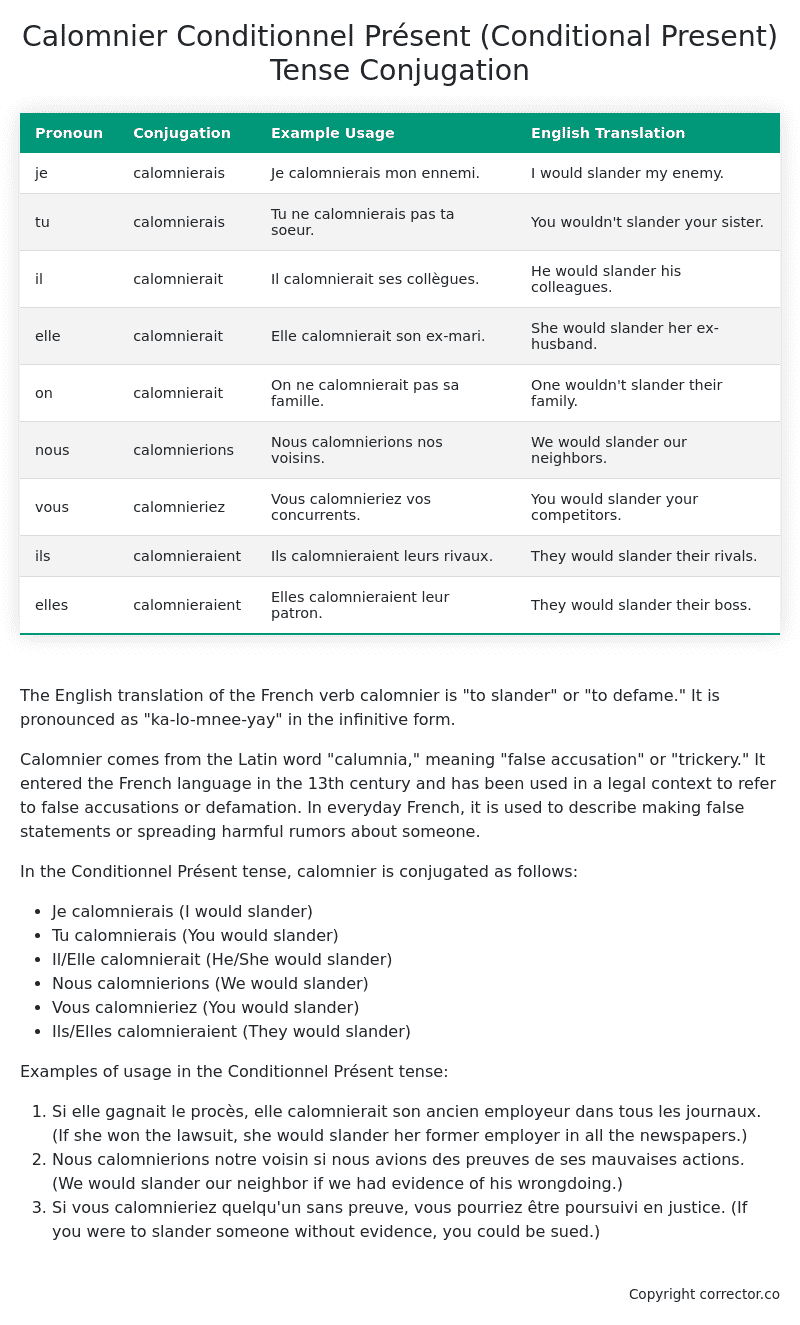Conditionnel Présent (Conditional Present) Tense Conjugation of the French Verb calomnier
Introduction to the verb calomnier
The English translation of the French verb calomnier is “to slander” or “to defame.” It is pronounced as “ka-lo-mnee-yay” in the infinitive form.
Calomnier comes from the Latin word “calumnia,” meaning “false accusation” or “trickery.” It entered the French language in the 13th century and has been used in a legal context to refer to false accusations or defamation. In everyday French, it is used to describe making false statements or spreading harmful rumors about someone.
In the Conditionnel Présent tense, calomnier is conjugated as follows:
- Je calomnierais (I would slander)
- Tu calomnierais (You would slander)
- Il/Elle calomnierait (He/She would slander)
- Nous calomnierions (We would slander)
- Vous calomnieriez (You would slander)
- Ils/Elles calomnieraient (They would slander)
Examples of usage in the Conditionnel Présent tense:
- Si elle gagnait le procès, elle calomnierait son ancien employeur dans tous les journaux.
(If she won the lawsuit, she would slander her former employer in all the newspapers.) - Nous calomnierions notre voisin si nous avions des preuves de ses mauvaises actions.
(We would slander our neighbor if we had evidence of his wrongdoing.) - Si vous calomnieriez quelqu’un sans preuve, vous pourriez être poursuivi en justice.
(If you were to slander someone without evidence, you could be sued.)
Table of the Conditionnel Présent (Conditional Present) Tense Conjugation of calomnier
| Pronoun | Conjugation | Example Usage | English Translation |
|---|---|---|---|
| je | calomnierais | Je calomnierais mon ennemi. | I would slander my enemy. |
| tu | calomnierais | Tu ne calomnierais pas ta soeur. | You wouldn’t slander your sister. |
| il | calomnierait | Il calomnierait ses collègues. | He would slander his colleagues. |
| elle | calomnierait | Elle calomnierait son ex-mari. | She would slander her ex-husband. |
| on | calomnierait | On ne calomnierait pas sa famille. | One wouldn’t slander their family. |
| nous | calomnierions | Nous calomnierions nos voisins. | We would slander our neighbors. |
| vous | calomnieriez | Vous calomnieriez vos concurrents. | You would slander your competitors. |
| ils | calomnieraient | Ils calomnieraient leurs rivaux. | They would slander their rivals. |
| elles | calomnieraient | Elles calomnieraient leur patron. | They would slander their boss. |
Other Conjugations for Calomnier.
Le Present (Present Tense) Conjugation of the French Verb calomnier
Imparfait (Imperfect) Tense Conjugation of the French Verb calomnier
Passé Simple (Simple Past) Tense Conjugation of the French Verb calomnier
Passé Composé (Present Perfect) Tense Conjugation of the French Verb calomnier
Futur Simple (Simple Future) Tense Conjugation of the French Verb calomnier
Futur Proche (Near Future) Tense Conjugation of the French Verb calomnier
Plus-que-parfait (Pluperfect) Tense Conjugation of the French Verb calomnier
Passé Antérieur (Past Anterior) Tense Conjugation of the French Verb calomnier
Futur Antérieur (Future Anterior) Tense Conjugation of the French Verb calomnier
Subjonctif Présent (Subjunctive Present) Tense Conjugation of the French Verb calomnier
Subjonctif Passé (Subjunctive Past) Tense Conjugation of the French Verb calomnier
Subjonctif Imparfait (Subjunctive Imperfect) Tense Conjugation of the French Verb calomnier
Subjonctif Plus-que-parfait (Subjunctive Pluperfect) Tense Conjugation of the French Verb calomnier
Conditionnel Présent (Conditional Present) Tense Conjugation of the French Verb calomnier (this article)
Conditionnel Passé (Conditional Past) Tense Conjugation of the French Verb calomnier
L’impératif Présent (Imperative Present) Tense Conjugation of the French Verb calomnier
L’infinitif Présent (Infinitive Present) Tense Conjugation of the French Verb calomnier
Struggling with French verbs or the language in general? Why not use our free French Grammar Checker – no registration required!
Get a FREE Download Study Sheet of this Conjugation 🔥
Simply right click the image below, click “save image” and get your free reference for the calomnier Conditionnel Présent tense conjugation!

Calomnier – About the French Conditionnel Présent (Conditional Present) Tense
Formation
Common Everyday Usage Patterns
Expressing Polite Requests
Expressing Hypothetical Situations
Expressing Doubt or Uncertainty
Interactions with Other Tenses
Present Tense
Past Tense
Future Tense
Conditional Perfect
Summary
Want More?
I hope you enjoyed this article on the verb calomnier. Still in a learning mood? Check out another TOTALLY random French verb conjugation!


